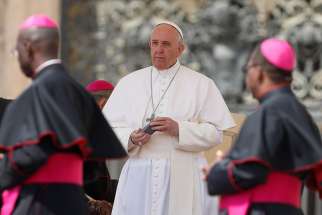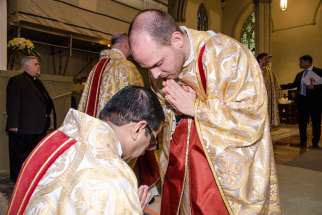Pope Francis has reminded believers that Jesus' love is infinite and true, unlike worldly passions that seek power and vanity.
Toronto welcomes two to a life of service
TORONTO – Cardinal Thomas Collins, in ordaining the two newest members to the Toronto priestly fraternity, let them know that as priests they are called to be servants of their flock.
The Holy Spirit strengthens us so that we may bear witness to the Lord even through persecution – even to the point of sacrificing our life. But also through the small persecutions like gossip and criticism. That’s what Pope Francis said Monday at the daily Mass at the Santa Marta guesthouse in the Vatican.
Joy of the Lord our strength
The joy of the Lord is our strength, and in Him we discover who we really are: this was the focus of Pope Francis’ reflection following the readings of the day at Mass in the chapel of the Casa Santa Marta on Thursday morning, the feast of St. Therese of Lisieux. The Holy Father focused especially on the need to cultivate nostalgia – deep yearning – for God in the Christian life.
The Lord assures us, we will not be forsaken
When we lose the great hymns of our past we lose an irrecoverable legacy. Alas as much as we hear “Lord of the Dance” at Mass, such happy-clappy tunes will provide little solace amidst a dark night of the soul.
All presidents beseech God to bless the United States of America. Many pray for divine aid for themselves or their policies. Some can only wonder at the inscrutable ways of the Almighty.
Then there’s Frank Underwood, who spits in God’s face.
There are no shortcuts to the Lord
Love, patience, humility and service each day will pave the way
26th Sunday in Ordinary Time (Year B) Sept. 30 (Numbers 11:25-29; Psalm 19; James 5:1-6; Mark 9:38-43, 45, 47-48)
The craving for power and control is at the heart of much human misery. Domination and exclusion go hand in hand with this desire and this is even more the case in the realm of the spirit. Religion is often used to manage people and societies and to define who is “in” and who is “out.”
Ironically, God is most generous with spiritual gifts — no one can ever accuse God of stinginess. In the reading from Numbers, Moses shared some of God’s Spirit that he had received with 70 elders of Israel — clearly a division and sharing of power. It was evident that the Spirit came upon them for they began to prophesy. Two of the group who were late and had missed out — this happens with any group — began to prophesy in camp. The reaction of Moses’ assistants was immediate and as expected: stop them! We can’t have this — they didn’t follow the rules and they weren’t here! Moses was neither impressed with their protests nor swayed. In fact, he chided the overzealous assistants. Why should they be jealous on his behalf? He didn’t feel the least bit threatened — in fact, he mused aloud that it would be wonderful if everyone in Israel were a prophet and had God’s Spirit within them.
The Spirit of God was poured out later on the first generation of believers in Jesus — on everyone, all flesh — as a fulfillment of a prophetic promise. Experiencing the indwelling of the Spirit of God and being able to give voice to the inspirations that it stirs within us is our birthright. Tragically it is one of the first gifts of God that we toss away, ignore or allow others to take from us.
No one owns or controls the Spirit of God, and as Scripture teaches us, the Spirit has a mind of its own and blows wherever it wills, often taking reluctant and protesting believers along for the ride.
Economic injustice is nothing new, even if it seems to be in the news more often. The author of James has something to tell us — something that Christians have not always been willing to hear: economic injustice is a spiritual issue. James’ rant against the wealthy was not because of their wealth but for the manner in which it was acquired. Defrauding the workers of their wages was regarded as dangerously close to murder in gravity.
We have our own examples of such fraud: the loss of life savings due to shady trading practices, the raiding and squandering of employee pension funds, as well as the bonuses and golden parachutes for some of those responsible. The letter of James is not as Luther claimed an “epistle of straw” but an epistle that we should all take to heart.
The same spiritual possessiveness noted in the first reading was alive and well among the disciples of Jesus. They were upset and outraged that someone who was not of their group was casting out demons in His name. After all, they had exclusive rights! Just as in the case of Moses, Jesus was unconcerned. If someone was inspired by His example and teachings enough to do good things in His name more power to them! The gifts of God’s Spirit will be given to those who have prepared their hearts and minds to receive it despite the label they may carry.
It is interesting that this was followed by some rather jarring language about people cutting off their hands and feet and gouging out their eyes. Biblical literalists pass over these words in silence and look for more congenial verses. This hyperbolic shock language is standard fare in biblical writings. It is meant to make a dramatic, stark and urgent point — in this case, the need for radical self-surgery if we are not comfortable with the type of person we have become.
Things will not “just work out,” nor will any divine intervention change our personality, character and level of spiritual growth — it doesn’t just happen. Opportunities will certainly be provided, but it remains to us to put into practice the necessary spiritual principles for transformation. There are no shortcuts, just the practical lessons of love, patience, humility and service each day.






